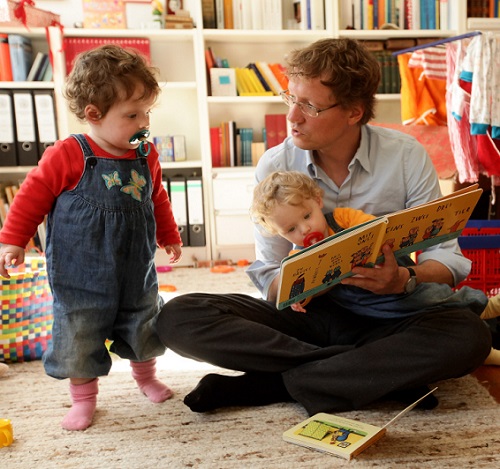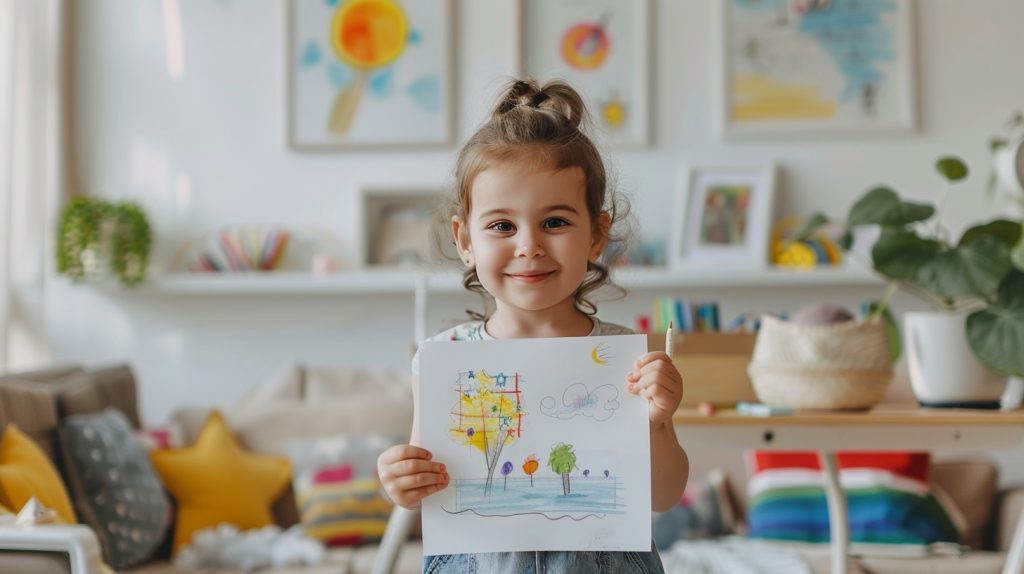Why Does Gender-Neutral Parenting Influence Childs Self-Identity?
Gender-neutral parenting shapes your child’s self-identity by challenging traditional gender stereotypes early on. This approach encourages them to explore and express themselves freely, fostering a belief in equality. It also helps develop emotional intelligence and empathy, while nurturing their individuality and autonomy. By breaking societal norms and expectations around gender, you provide your child with a solid foundation for self-confidence. This approach cultivates a mindset that values diversity and inclusivity in parenting practices, ultimately enhancing your child’s overall self-identity.
Key Takeaways
- Encourages exploration of diverse interests and skills.
- Fosters self-discovery and confidence through play.
- Challenges societal norms and stereotypes.
- Cultivates individuality, autonomy, and self-worth.
- Builds a foundation for self-confidence and resilience.
Breaking Gender Stereotypes Early

To foster gender-neutral parenting and break gender stereotypes early, parents can introduce a variety of toys and activities to their children, encouraging exploration and self-expression without limitations based on traditional gender norms. Gender-neutral fashion and unisex toys play an essential role in this process.
Gender-neutral fashion allows children to express themselves freely without being confined to stereotypical colors or styles associated with their gender. This encourages children to develop their own unique sense of style and identity, independent of societal expectations.
Similarly, providing children with unisex toys helps promote diverse interests and skill development without the constraints of gender norms. By offering toys that aren’t specifically marketed towards one gender, children are encouraged to explore a wider range of activities and interests.
This fosters a sense of inclusivity and equality from a young age, laying the foundation for a more open-minded and accepting society in the future. Research suggests that exposing children to gender-neutral fashion and unisex toys can positively impact their self-identity and help break down traditional gender stereotypes.
Encouraging Self-Exploration and Expression

Encourage your child’s self-discovery through play, as research shows that play is essential for cognitive and social development.
Support your child’s authentic self-expression by providing a safe and accepting environment for them to freely explore their interests and emotions.
Nurturing your child’s unique interests openly can help them develop a strong sense of self-identity and confidence in their individuality.
Foster Self-Discovery Through Play
Facilitate children’s self-discovery by providing opportunities for unstructured play that allow for natural exploration and expression of their individuality. Research suggests that open-ended play is vital for fostering self-discovery in children. Through imaginative exploration and creative expression in play, children can experiment with different roles, emotions, and scenarios, aiding in the development of their self-identity.
Studies have shown that open-ended play encourages self-discovery by allowing children to engage in activities based on their interests and preferences. This type of play enables them to make choices, solve problems, and express themselves freely, promoting autonomy and self-awareness. By engaging in activities that aren’t structured or directed by adults, children can explore their capabilities, preferences, and boundaries, leading to a deeper understanding of themselves.
Providing ample time and space for open-ended play is essential for children to engage in self-discovery. By encouraging unstructured play that supports imaginative exploration and creative expression, parents can help children develop a strong sense of self and individuality.
Support Authentic Self-Expression
Supporting authentic self-expression in children involves fostering an environment that values and nurtures their innate creativity and individuality. Authentic creativity is essential for children as it allows them to explore their thoughts, emotions, and experiences through various forms of expression, such as art, music, or storytelling.
Encouraging self-discovery through creative outlets provides children with a safe space to explore their identities and develop a sense of personal empowerment. By embracing their individuality, children can learn to express themselves confidently and authentically.
Research indicates that when children are supported in their self-expression, they’re more likely to develop a strong sense of self-awareness and self-esteem. This enables them to navigate social interactions more effectively and form healthier relationships based on mutual respect and understanding.
Cultivating a culture that values and celebrates individuality not only fosters creativity but also promotes a sense of belonging and acceptance. Ultimately, by encouraging authentic self-expression, parents can empower their children to embrace who they’re and confidently navigate the complexities of self-identity.
Nurture Unique Interests Openly
Fostering a supportive environment that encourages children to openly nurture their unique interests is vital in promoting self-exploration and expression. Creative exploration allows children to investigate various activities, fostering a sense of curiosity and self-discovery.
Research shows that when children are supported in exploring their unique interests, they develop a stronger sense of self-identity and confidence. By encouraging creative exploration, parents can help children uncover hidden talents and passions, leading to a more fulfilling and authentic self-expression.
Open communication plays an important role in nurturing unique interests openly. When parents actively listen to their children’s thoughts and ideas without judgment, children feel empowered to express themselves freely. Studies indicate that children who experience open communication with their parents are more likely to explore diverse interests and develop a strong sense of self-awareness.
Fostering a Sense of Equality

To foster a sense of equality in your child, promoting gender inclusivity is essential. Research suggests that encouraging self-expression without gender stereotypes can help children develop a more egalitarian mindset.
Promoting Gender Inclusivity
How does promoting gender inclusivity in parenting practices contribute to fostering a sense of equality in children’s self-identity development?
Gender-neutral fashion and the use of inclusive language are key components in promoting gender inclusivity. Research shows that exposing children to a variety of clothing options regardless of traditional gender norms can help them develop a more fluid understanding of gender roles and expression. By encouraging children to choose clothes based on personal preference rather than societal expectations, parents can instill the idea that one’s identity isn’t limited by gender stereotypes.
Similarly, using inclusive language that avoids gender-specific pronouns or assumptions can create a more equitable environment for children to explore their identities. Studies indicate that children raised in households where language is gender-neutral tend to have a more expansive view of gender possibilities and are more likely to embrace diversity in self-expression.
Encouraging Self-Expression
Encouraging children to explore diverse forms of self-expression within a gender-neutral parenting framework can greatly impact their development of a well-rounded and inclusive self-identity. Creative exploration allows children to discover their personal style without the constraints of traditional gender norms. Research suggests that providing artistic freedom fosters a sense of self-discovery and empowerment in children, enabling them to express themselves authentically.
Studies indicate that children raised in environments that promote self-expression develop a stronger sense of confidence and individuality. By encouraging children to explore various forms of creativity, parents can help them cultivate a deeper understanding of themselves and others. This inclusive approach to self-expression promotes a sense of equality by valuing each child’s unique identity without judgment or limitation.
Promoting Emotional Intelligence and Empathy
Fostering emotional intelligence and empathy in children is essential for their overall social and psychological development. By encouraging children to explore emotions beyond traditional gender stereotypes, gender-neutral parenting can play a significant role in promoting these vital skills.
Research suggests that children raised in gender-neutral environments tend to exhibit higher levels of emotional intelligence and empathy compared to those in more traditional settings.
Empathy, the ability to understand and share the feelings of others, is a key component of emotional intelligence. When children are allowed to explore a wide range of emotions without being constrained by societal expectations based on gender, they develop a deeper understanding of their own emotions and those of others.
This understanding leads to more compassionate and empathetic behavior towards their peers.
Cultivating Individuality and Autonomy

Cultivating individuality and autonomy in children through gender-neutral parenting practices enhances their sense of self-worth and independence. Research indicates that promoting independence from a young age allows children to develop essential decision-making skills, boosting their confidence in their own abilities.
By fostering creativity and encouraging curiosity, parents can cultivate uniqueness in their children, empowering them to explore their interests and passions without conforming to traditional gender stereotypes.
Studies have shown that children raised in gender-neutral environments tend to exhibit higher levels of self-assurance and resilience, as they’re encouraged to express themselves authentically. This approach also helps children develop a strong sense of autonomy, enabling them to make choices based on their preferences rather than societal expectations.
When children are supported in exploring a wide range of activities and interests without being confined by gender norms, they’re more likely to embrace their individuality and develop a strong sense of self. Overall, cultivating individuality and autonomy through gender-neutral parenting practices lays a solid foundation for children to navigate the complexities of self-identity with confidence and authenticity.
Challenging Societal Norms and Expectations
Challenging societal norms and expectations requires a deliberate and conscious effort to question and redefine traditional gender roles within the family dynamic. Research shows that societal norms heavily influence our perceptions of gender and how we raise children. By challenging these norms, parents can help break the cycle of reinforcing gender stereotypes from an early age. Studies have demonstrated that early intervention in challenging traditional gender expectations can lead to positive outcomes for children’s self-identity development.
When parents actively challenge societal norms by avoiding gender-specific toys, clothes, and activities, children are more likely to explore a wider range of interests without feeling constrained by traditional gender roles. This approach fosters a more inclusive environment where children can develop their sense of self based on personal preferences rather than societal expectations.
Embracing Diversity and Inclusivity
Embracing diversity and inclusivity in parenting practices involves consciously creating an environment that encourages children to explore their interests without being limited by traditional gender expectations. By promoting acceptance and celebrating differences, parents can foster understanding and embrace uniqueness in their child’s development. Research suggests that children raised in environments that value diversity and inclusivity tend to have higher self-esteem and a more positive self-identity.
Studies have shown that exposing children to a variety of cultures, beliefs, and experiences can help them develop empathy and respect for others. By encouraging children to interact with individuals from diverse backgrounds, parents can instill a sense of openness and acceptance towards different perspectives. This exposure not only broadens their worldview but also teaches them the importance of inclusivity and tolerance.
Incorporating diverse role models and narratives into a child’s upbringing can also have a significant impact on their self-identity. By showcasing individuals from various backgrounds who’ve overcome challenges and achieved success, parents can inspire their children to embrace their own uniqueness and pursue their goals without being constrained by societal expectations.
Building a Foundation for Self-Confidence

To establish a strong sense of self-confidence in children, parents can implement intentional strategies that promote self-esteem and resilience from an early age. Building resilience and instilling confidence are vital components in nurturing a child’s self-identity. Research suggests that children who are encouraged to overcome challenges and setbacks develop a greater belief in their abilities, leading to increased self-confidence.
By providing a supportive environment where failures are viewed as opportunities for growth rather than sources of shame, parents can help their children develop a resilient mindset.
Encouraging self-acceptance and fostering empowerment are also key aspects of building a foundation for self-confidence. When children are taught to embrace their unique qualities and differences, they learn to value themselves for who they are, rather than seeking validation from external sources.
Empowering children to make choices, solve problems, and express themselves helps foster a sense of autonomy and self-assurance. By promoting self-acceptance and empowerment, parents can equip their children with the tools necessary to navigate the complexities of self-identity with confidence.
Frequently Asked Questions
How Can Gender-Neutral Parenting Impact a Child’s Social Interactions?
Gender-neutral parenting fosters open-mindedness in you, impacting peer relationships positively by challenging societal gender norms. At school, dynamics shift as you navigate interactions based on personal interests rather than conforming to traditional expectations of gender roles.
What Are Some Challenges Parents May Face While Practicing Gender-Neutral Parenting?
When practicing gender-neutral parenting, you may encounter challenges like managing peer pressure and stereotypes that enforce traditional gender norms. The school environment and media influences can also make it difficult to maintain this approach.
Can Gender-Neutral Parenting Affect a Child’s Academic Performance?
Gender-neutral parenting can positively impact academic success by challenging traditional gender stereotypes. In the classroom, it can create more inclusive dynamics, free from limiting gender expectations. Children raised this way may experience increased confidence and broader opportunities.
How Do Extended Family Members Typically React to Gender-Neutral Parenting?
When practicing gender-neutral parenting, extended family members may exhibit a range of responses. Family dynamics can vary, with some showing acceptance while others struggle due to generational differences. Understanding and open communication are essential for harmony.
Are There Specific Cultural Considerations to Keep in Mind With Gender-Neutral Parenting?
In gender-neutral parenting, understanding cultural norms is essential. Parental support can vary based on cultural backgrounds, impacting how this parenting style is perceived. Research suggests that cultural considerations play a significant role in shaping attitudes towards gender-neutral parenting practices.
Conclusion
In summary, gender-neutral parenting plays a significant role in shaping a child’s self-identity by breaking traditional stereotypes, promoting self-exploration, fostering equality, enhancing emotional intelligence, cultivating individuality, challenging societal norms, embracing diversity, and building self-confidence.
Research suggests that this approach can have a positive impact on a child’s development, allowing them to navigate their identity with authenticity and resilience in a world that often imposes rigid gender expectations.

Chad Adan Kace, a young dad from Vermont, shares his parenting journey with a touch of humor and lots of love. Father to a lively baby, he explores the joys and challenges of fatherhood through his stories.







